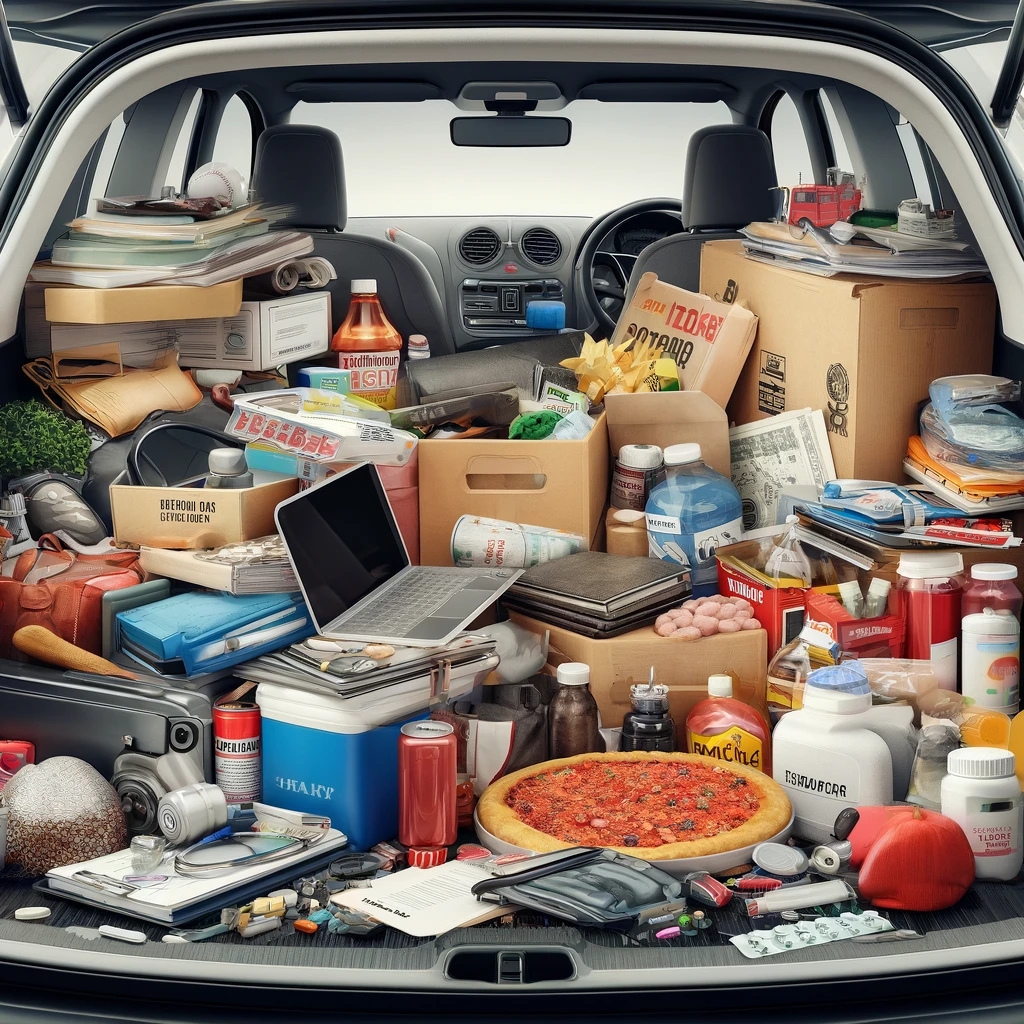Storing the wrong items in your car’s trunk can lead to serious problems, from safety hazards to potential theft. In our latest guide, we’ll uncover the 12 things you should never keep in the trunk of your car. Whether it’s due to extreme temperatures, theft risk, or the potential for damage, these items deserve better storage solutions.
1. Electronics
Electronics are highly sensitive to temperature changes. Extreme cold or heat in the trunk can damage them. Think twice before leaving devices like laptops or tablets in your car. Batteries can also leak or explode under high temperatures. If you must transport electronics, take them with you when you leave the car.
2. Perishable Food Items
Perishable foods can spoil quickly in a trunk, especially in warm weather. Spoiled food can attract pests and produce unpleasant odors. If you’re transporting groceries, take perishables inside as soon as possible. Remember, a trunk is not a refrigerator. In some cases, leaking food can also stain trunk linings or seep into difficult-to-clean spaces.
3. Sensitive Documents
Important documents like birth certificates, passports, or legal papers should not be left in the trunk. If your car is stolen or broken into, these could fall into the wrong hands. Always keep such documents in a secure location. Identity theft is a real threat and leaving sensitive information in your car increases that risk.
4. Medication
Extreme temperatures can alter the effectiveness of medication. Most medicines require stable conditions, which a car’s trunk cannot provide. If medicines are exposed to high temperatures, their chemical composition can change. For your health, keep meds with you or at home in a controlled environment.
5. Hazardous Materials
Items like paint, propane, or other chemicals should never be stored in the trunk. Heat can cause these materials to expand and potentially explode. For your safety and the safety of others on the road, transport them carefully and remove them from your car as soon as possible.
6. Pressurized Cans
Aerosol cans, such as hairspray or spray paint, can explode when left in a hot trunk. This is not only dangerous but can also cause significant damage to your vehicle’s interior. Always store pressurized cans in a cool, dry place away from direct sunlight.
7. Wine and Liquor
Temperature fluctuations can ruin the quality of wine and liquor, affecting their flavor and longevity. Heat can cause wine bottles to leak or even explode. If you’re transporting alcoholic beverages, keep them in a climate-controlled environment until they can be properly stored.
8. Flammable Objects
Flammable objects like fireworks or matches should not be kept in your car. The risk of ignition from high temperatures or friction is too high. Store these items safely away from any heat sources, including your vehicle.
9. Pets
Never leave pets in the trunk or even the cabin of a vehicle, especially on warm days. Vehicles can quickly become ovens, leading to fatal heatstroke for pets. Always keep your pets with you or leave them home if they’re not welcome at your destination.
10. Plastic Water Bottles
Plastic bottles can release harmful chemicals when exposed to high heat. If you leave a plastic water bottle in the trunk, especially on a hot day, chemicals like BPA could leach into the water. Opt for reusable, insulated water bottles instead.
11. Excessive Cash or Jewelry
Keeping valuables like excessive cash or jewelry in your trunk invites theft. If your vehicle is targeted by thieves, you could lose significant personal assets. Always carry such items with you or leave them in a secure place at home.
12. Spare Electronic Key Fobs
Keeping a spare key fob in your trunk can make it easier for thieves to steal your car. Advanced thieves can amplify the signal of your key fob to unlock and start your vehicle without much difficulty. Keep spare fobs in a secure, offsite location.
Make Your Trunk a Safe Space
Remember, the trunk of your car is not safe for valuables or a storage unit for hazardous items. By understanding and implementing these tips, you can prevent accidents, reduce theft, and maintain the condition of your vehicle. Share this information to promote safety and awareness among your peers.
Read More















